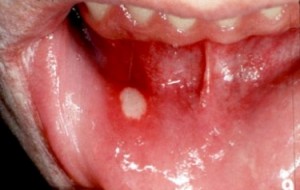Mouth Ulcers
Mouth ulcers are small painful sores that form in the mouth. The most common type is called aphthous or simple ulcers.
There are three main types of ulcers:
- Minor ulcers are small, non-scarring and usually heal without any treatment within two weeks.
- Major ulcers are 1cm or larger, have a raised border and can last from two weeks to several months. Usually only one or two appear at a time. They can be very painful and cause difficulty eating, are slower to heal and can leave scars.
- Herpetiform ulcers are multiple tiny sores that can be very painful, particularly if they fuse together to form one larger sore. They can last from one week to two months.
Who’s at risk from ulcers?
Most people have at least one attack of mouth ulcers in their lifetime, but mouth ulcers are more common in women and those under the age of 40. Up to one in five people have repeated attacks of mouth ulcers.
More than a third of people with recurrent mouth ulcers have a family history of it. This figure rises to over 80% if both parents get frequent mouth ulcers.
What causes mouth ulcers?
Minor mouth ulcers are usually caused by:
- Damage to the inside lining of your mouth by very hot or acidic food or drink
- Biting your inner cheeks
- Brushing your teeth and gums very hard
- Poorly fitted dentures or orthodontic appliances (braces)
- A very dry mouth due to a medical condition
- Eating food to which you are allergic
- Trauma from food like crusty bread and crisps
- Stress, or lacking vitamins or minerals
- Certain medications
Certain medical conditions can also make mouth ulcers more likely, such as:
- Vitamin B12 deficiency
- Viral infections
- Iron deficiency
- Celiac disease ( intolerance to a protein called gluten )
- Crohn’s disease
- HIV infection
What are the symptoms?
Most mouth ulcers are easy to spot because they are round or oval in shape, whitish in colour and inflamed around the edge.
They are usually seen on the inside of the lips and cheeks, on the floor of the mouth and under the tongue.
Treatment of mouth ulcers
Most mouth ulcers do not need specific treatment and heal naturally without medication. Mouth ulcers usually heal within 7 – 14 days, however treatment can help to numb the pain, protect the ulcer from further damage and decrease the chances of a bacterial infection. Some medicines may also speed up the healing if used early.
In a very small number of cases, ulcers may be a sign of mouth cancer. The recovery rate for mouth cancer is good if spotted early enough, so you should get any persistent mouth ulcers checked out and have regular check-ups with your dentist. We offer a mouth cancer screening service, if you are concerned or interested please do contact us.
Dr Nishan Dixit
Latest posts by Dr Nishan Dixit (see all)

